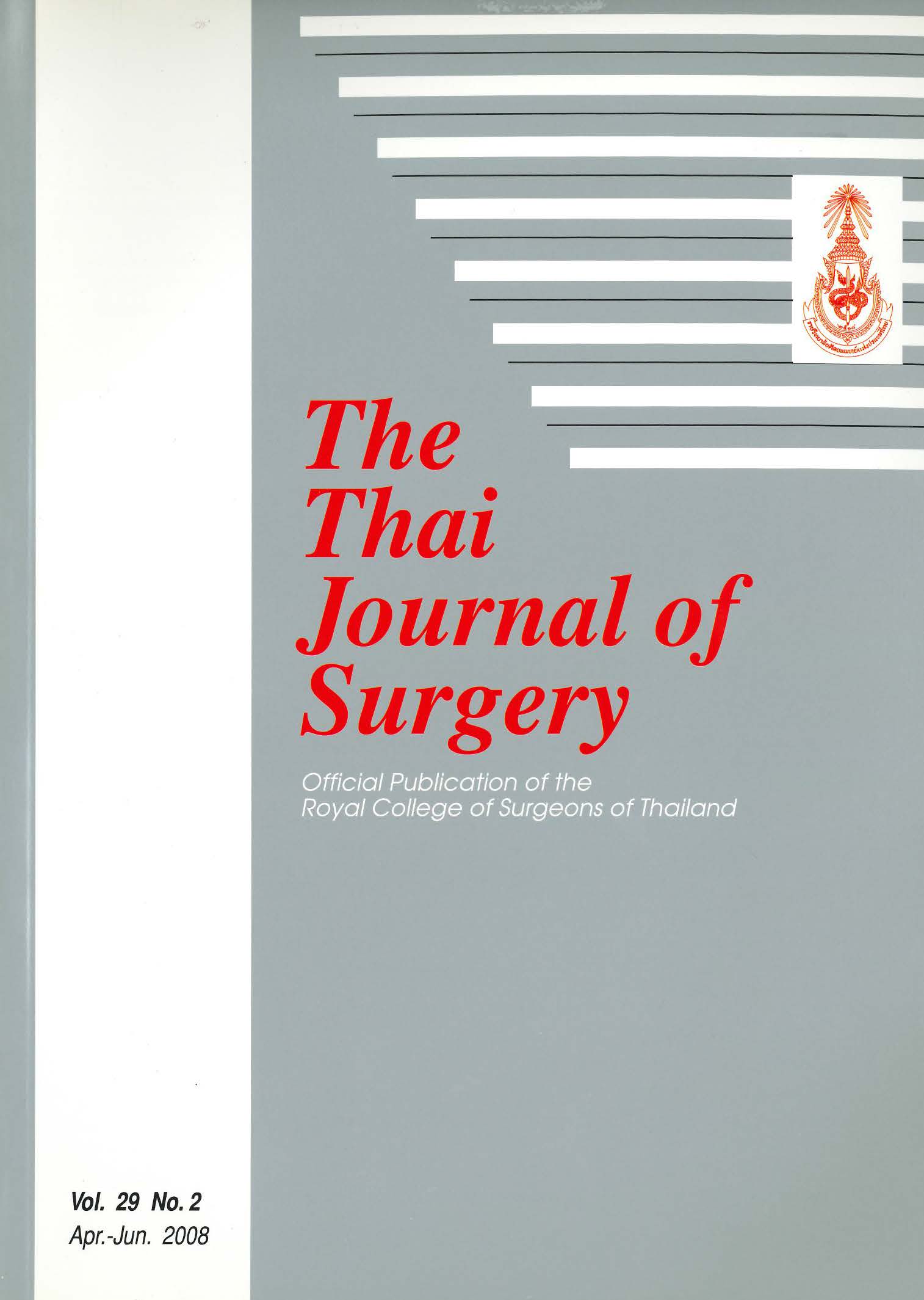Does Age Really Matter in Outcome Prediction Post CABG
Abstract
Objectives: This retrospective study observed the elderly patients (≥71 years old) undergoing lone
CABG by single surgical team and same leading surgeon during the period of September 1997 to September 2007. The aim of the study was to find out whether chronological age is an independent mortality and major morbidity predicator of CABG surgery in Thai population.
Materials and Methods: One hundred and forty cases were divided into 2 groups; group A (younger age group) from 60-70 years old (n = 91) and group B (elderly group) from 71-89 years old (n = 49). The comparison of data was done under several variables such as preoperative risk factors, operative and post operative outcomes.
Results: Higher incidence of female gender in elderly (B) group, higher coronary risk factors and more critical angiographic lesions in younger (A) group were noted. Atherosclerotic diseases (CVA, PVD, and hypertension) as comorbid factors observed preoperatively were surprisingly not significantly different between the 2 groups. Although the incidence of renal dysfunction (Cr≥22) was higher among elderly, it did not affect CABG outcome and cannot be used as a predictor for higher potential of post-operative dialysis. The universal acceptance of cardiogenic shock with preoperative IABP, emergency surgery, poor EF as potent in-hospital mortality predictors was positive in this study. Postoperative stroke rate was insignificantly different between the 2 groups. In-hospital mortality in elderly group was 1.5 times higher than the younger group but there was no statistical significance (p value).
Conclusions: CABG in the elderly carries certain surgical risks. However, chronological age, by itself, is not independent survival predictor. The inferior mid- and long-term survival in the elderly was merely due to biological nature of aging.
References
2. Mahidol University population study in 2007 from Annual medical care for the elderly. Vichaiyoth J 2008:3.
3. Loop FD, Lytle BW, Cosgrove DM, et al. Coronary artery bypass graft surgery in the elderly: indications and outcome. Cleve Clin J Med 1988;55:23-34.
4. Dalrymple-Hey MJ, Alzetani A, Aboel-Nazar S, et al. Cardiac surgery in the elderly. Eur J Cardiothorac Surg 1999:15:61-6.
5. Available at http://www.sts.org/section/stsdatabase/. Accessed July 1, 1999.
6. Fruitman DS, MacDougall CE, Ross DB, Cardiac surgery in octogenarians: can elderly patients benefit? Ouality of life after cardiac sury. Ann Thorac Surg 1999; 68:2129-35.
7. Akins CW, Daggett WM, Vlahakes GJ, et al. Cardiac operation in patients aged 80 years old and older. Ann Thorac Surg 1997:64:606-14.
8. Peterson ED, Cowper PA, Jollis JG, et al. Outcomes in coronary artery bypass graft surgery in 24, 461 patients aged 80 years or older. Circulation 1995;92:85-91.
9. Peterson ED, Alexander KP, O'Connor GT, et al. The safety of coronary artery bypass surgery in the aged. Circulation 2000;102:3288.
10. Merrill WH, Stewart JR, Frist WH, Hammon JW, Bender HW. Cardiac surgery in patients aged 80 years or older. Ann Thorac Surg 1990;211:772-6,
11. Weintraub WS, Clements SD, Ware J, et al. Coronary artery surgery in octogenarians. Am J Cardiol 1999;68:1530-4.
12. Tsai TP, Nessim S, Kass RM, et al. Morbidity and mortality after coronary artery bypass in octogenarians. Ann Thorac Surg 1991;51:983-6.
13. Nauheim KS, Dean PA, Fiore AC, et al. Cardiac surgery in the octogenarians. Eur J Cardiothorac Surg 1990;4:130-135.
14. Hirose H, Amano A, Yoshida S, Takahashi A, Nagano N, Kohmoto T. Coronary artery bypass grafting in the elderly. Chest 2000;5:1262-70.
15. Sahar G, Raanani E, Sagie A, et al. Surgical results in cardiac patients over the aged 80 years. Isr J Med Sci 1996;32:1322-5
16. Cosgrove DM, Loop FD, Lytle BW, et al. Does mammary artery grafting increase surgical risk? Circulation 1985;72:170-4.
17. Reardon MJ, Conklin LD, Reardon PR, et al. Coronary bypass conduits: review of current status. J Cardiovasc Surg 1997:38:201-19.
18. Barner HB. Arterial grafting; techniques and conduits. Ann Thorac Surg 1998;66: S2-S5.
19. Carrel T, Horber P, Turina MI. Operation for two-vassel coronary artery disease: midterm results of bilateral ITA grafting versus unilateral ITA and saphenous vein grafting. Ann Thorac Surg 1996; 62:1289-94.
20. Cooper GJ, Underwood MJ, Deverall PB. Arterial and venous conduits for coronary artery bypass: a current review. Eur J Cardiothorac Surg 1996;10:129-40.
21. Williams DB, Carrillo RG, Traad EA, et al. Determinants of operative mortality in Octogenarians undergoing coronary bypass. Ann Thorac Surg 1995;60:1038-43.
22. Talwalkar NG, Damus PS, Durban LH, et al. Outcome of isolated coronary artery bypass surgery in octogenarians. J Card Surg 1996;11:172-9.
Downloads
Published
How to Cite
Issue
Section
License
Articles must be contributed solely to The Thai Journal of Surgery and when published become the property of the Royal College of Surgeons of Thailand. The Royal College of Surgeons of Thailand reserves copyright on all published materials and such materials may not be reproduced in any form without the written permission.



